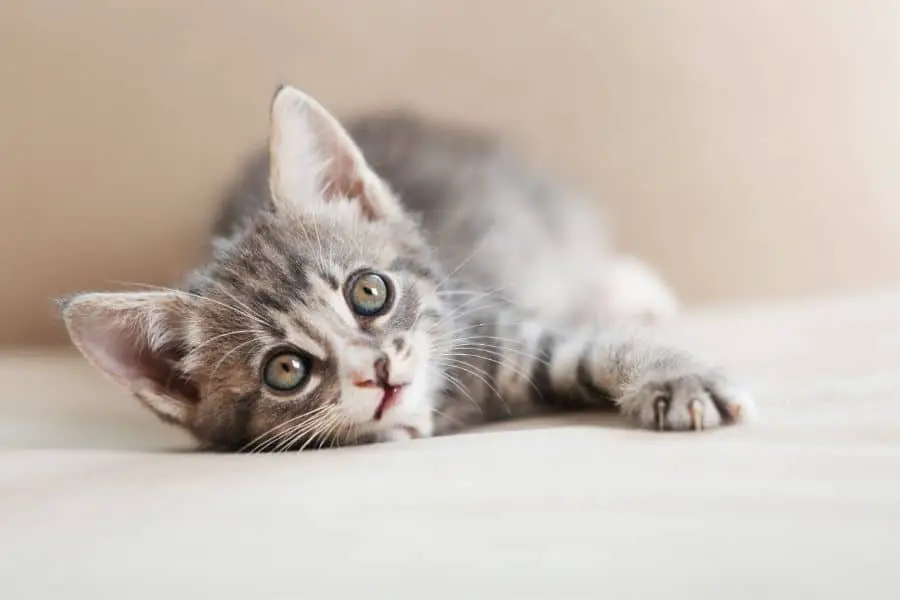More Meows is an Amazon Associate. As an Amazon Associate we earn from qualifying purchases. We may also earn commissions if you purchase products from other retailers after clicking on a link from our site.
Caring for a kitten can be one of the most joyful periods of any animal lover’s life, but it can be incredibly perplexing, especially if the kitten is incredibly young. There are so many aspects to consider, and there is pressure to ensure they stay healthy. So, do baby cats drink water?
Nursing kittens (baby cats) receive sustenance from their Mother’s milk and do not drink water. Young orphaned kittens will eat a special formula (that is mixed with water) until about four weeks of age. After weaning, kittens will wean and need to drink water.
Ensuring that your fur baby gets enough water and nourishment in their diet may seem incredibly complex, but it can indeed be simple and enjoyable for both of you with the right steps and knowledge. Stick around to find out why kittens need water and how to go about creating a great nutritional plan for them. Always consult a professional for specialized guidance, as each kitten’s needs may differ slightly.
Do Baby Cats Drink Water?
Baby kittens do not need to drink water if they are nursing from their mother cat. They should be just fine until they wean at about four weeks of age. Baby cats that were orphaned and needed to be nursed by a human will drink water since it is normally mixed in kitten formula. So, the answer to the question is that baby cats do not need to drink water until they are weaned.
Do weaning kittens need water?
Yes, all weaned kittens need to have a well-organized hydration plan to continue developing proper cognitive and bodily function, and they cannot survive for long without water. Weaned kittens need water for basic functions. These bodily functions include urinating and defecating. Water also helps the kitten as their joints and tissue grow since it keeps them from drying out.
Kitten does not drink water

There are plenty of harmful side effects of weaned kittens not getting enough water, especially since they are young, fragile, and may not drink when needed. The deficiency of water can cause an extensive array of destructive consequences, most of which will need medical attention to resolve safely for a kitten.
They also have smaller bodies and developing organs, which means that they are more susceptible to the effects of dehydration as opposed to grown cats. They will not survive awfully long without enough water content in their diets.
Signs of dehydration in kittens
Much like cats, kittens can become dehydrated. Dehydration can be recognized by reduced skin elasticity, salivating, quivering, unusual urination, dry or sticky gums, a weak pulse, a raised heart rate, panting, weakness, and a diminished appetite. A visit to the vet is recommended in the event of such symptoms, as a medical intervention may be necessary to combat these symptoms.
Dehydration in kittens can also be caused by diarrhea, common for kittens who experience skipped feeding sessions or over-feeding from the caregiver. Since they are small and weak, such cases can be severe and fatal, so a veterinary visit is recommended.
Urinary and kidney problems in kittens
A lack of adequate water in the diet may also lead to problems with the bladder and kidney, especially since the kitten’s organs are still growing and becoming stronger. This may disrupt function and may even cause issues that will only become evident later in the kitten’s life.
An inadequate water supply can also cause urinary tract infections in kittens, disrupting how urine comes out of their body. This may be treatable with the appropriate steps, but it will be incredibly painful and uncomfortable for your fur baby. It’s best to ensure there is enough water in their diet to avoid such situations.
Can kittens drink water instead of milk?
Kitten-specific milk is beneficial for baby kittens since it provides sufficient nutrition and hydration during the neonatal phase. Many people may make the mistake of continuing to provide milk when it is no longer necessary, and the kitten should be moving onto the next phase of its diet.
Neonatal kittens only need milk or kitten formula (which is often mixed with water) for the first four to six weeks, after which they should be weaned off of milk and formula and should gradually become comfortable with soft foods and water. At around 4 – 6 weeks, they should drink water for hydration and start eating soft foods.
What does milk do for kittens?
The main reason caregivers give baby kittens milk or kitten formula is that it is very high in calories and contains various additives such as protein, calcium, and other minerals that help grow kittens. This is beneficial for young kittens who would have naturally fed from their mother and cannot consume solid foods yet. Thus, it is a simple way to add sufficient nutrition to their diet during this time.
What kind of milk can kittens drink?
The best milk would ideally be the natural milk from the kitten’s mother, which is another reason why kittens should remain with their mother for the first few weeks of their lives. If this milk is not available and you need some milk for your fur baby, you may purchase a mother’s milk substitute from pet stores, specifically suitable for kittens.
If you are unsure what kind of milk kittens can drink, you may approach a veterinarian for professional guidance on which milk substitute would be best. You should not give cow’s milk to a cat.
Can kittens drink cow’s milk?
Contrary to popular belief, most cats are, in fact, lactose intolerant. This means that any milk containing lactose, such as cow’s milk, may be harmful to them and may result in similar symptoms to lactose intolerant humans. Thus, it’s important for caregivers to never give such milk products to kittens. Furthermore, this milk does not have the same minerals that kitten formula does; thus, they may not be getting much from the milk according to their nutritional requirements.
Any milk which has not specifically been made for kittens can harm them. Potential side effects of consuming milk with lactose in it include malnutrition and stomach issues as a result of the lactose’s inability to successfully pass through the kitten’s intestines. These after-effects typically occur only a few hours after the ingestion and may or may not worsen with time.
How much milk should kittens drink?
Like the water necessities for cats of all ages, the overall amount of milk that kittens need will depend on the size and age of the kitten. Usually, kittens need to be provided with milk around 6 – 7 times per day, and they should be fed around the clock to stay healthy.
In some cases, kittens need to be fed as frequently as every 2 – 3 hours, but this will depend on the kitten. If I were in the position of raising a baby cat myself, I would reach out to my local veterinarian and maybe even a nonprofit cat organization.
Do Kittens Drink a Lot of Water?
When the kitten is ready to wean off the bottle, they should slowly begin drinking water and eating soft foods. The amount of water that kittens need will depend on their size and exact age, similar to their nutritional needs. Even when cats are fully grown, they drink in small amounts around the clock, and kittens will need to be provided with water similarly.
How much water do kittens need?
Although weaned kittens drink different water quantities, you can expect them to drink 3.5 to 4.5 ounces of body weight. Kittens may drink less than this estimate and may need encouragement to drink more. If the kitten is over-drinking, it could indicate medical issues that will need professional assistance from a veterinarian to identify and resolve.
Conclusion
Baby cats that are nursing from their mother cat do not need to drink water until they are weaned. Baby cats that are orphaned and raised by humans will end up drinking water since it is usually mixed with their formula. Again, after they are weaned, they will drink water more traditionally. If you have any questions about nursing kittens and water, you should ask a veterinarian.
If you enjoyed this article, take a look at a few others:
- Do Feral Cats Abandon Their Kittens? The Full Truth: Click Here.
- Do Stray Cats Kill Kittens? Rare Cat Murder: Click Here.
- Do Cats Like Blankets? (Simple Answers): Click Here.
